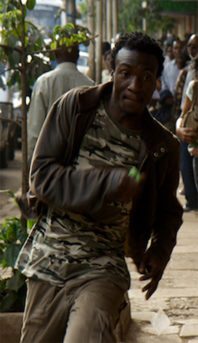
David Tosh Gitonga’s Nairobi Half Life is probably the trope-iest selection in the Africa Now retrospective. It has Mwas (Joseph Wairimu), a cinephile who goes to Nairobi to pursue an acting career. But these tropes probably make it more relatable. And things happen to quickly to Mwas add to the seriousness of his predicament. He steps off the bus into the Kenyan capital’s streets. And a minute later, a gang robs him. Just like that he’s part of a crowd and a sociological trend but as these stories go, being part of the crowd doesn’t stop him from standing out.
Reality is a delicate balance, and Nairobi Half Life captures that. He doesn’t romanticize the violence and poverty in these streets and neither does he exploit those living there. But this is, after all, a character study of Mwas. The film shows the city through his eyes and his physicality. He doesn’t need to use his face to show his quick transformation. There’s no time to react, and Wairimu shows that through his performance here. The only thing he has time for is to adapt to him new environment, and to survive there through any means.
Just like someone moving into a new environment, Mwas gets into a lifestyle that he didn’t intend to be a part of. It shows one of the lives he leads as he becomes a member of the kinds of gangs that would have taken advantage of guys like him. And it’s interesting for him, an enthusiast of acting, to use those talents as a gangster. And in its part, Naroibi Half Life is thrilling when depicting scenes where his gang steals car parts. It does that while walking a fine line of not glamorizing these actions.
Dichotomies are abound in Nairobi Half Life, even when it’s showing the slums where Mwas finds himself. Most gangland dramas are too masculine, but Mwas’ sensitivity and innocence offsets that. The film introduces us to Oti (Olwenya Mania), the one who introuces Mwas to gang life, a person who eventually trusts him with bigger and bigger tasks. It also exposes us to Amina (Nancy Winjiku Karanja), a sex worker has her own dreams, who is tougher than Mwas assumes she is. Their scenes together highlight the emotional burdens and sacrifices that both their jobs require.
Intermittently, Nairobi Half Life shows us the silvery skyscrapers, symbolizing Mwas’ dreams. Neighborhoods like that is where Mwas goes to pursue hs acting career, eventually having a side hustle as a player in a theatrical troupe. This film doesn’t just show the difficulties of having two careers. In a play, he gets the role of an activist criminal. This film doesn’t just speak on the plight of the average Kenyan but the performative nature of such plight. Both Mwas and Wairimu embody these layers, an actor playing an upcoming actor performing a role of a lifetime.

